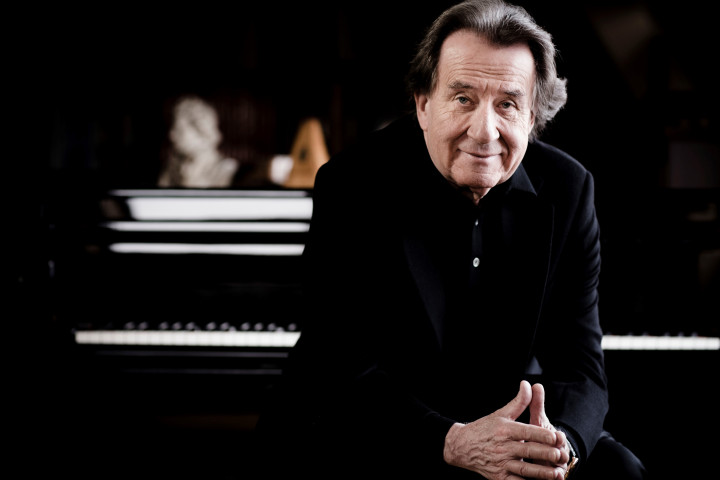
Pressemitteilung: Rudolf Buchbinder spielt Regers Klaviertranskriptionen von Brahms-Liedern – 22.3.2024 (VÖ) (DE/EN)
29.02.2024
Please scroll down for English version
Rudolf Buchbinder mit Liedern ohne Worte
Der renommierte österreichische Pianist spielt Max Regers wenig bekannte Klaviertranskriptionen von einigen der schönsten Lieder von Johannes Brahms
»Es hat mich zutiefst berührt, mich in diese Kleinodien zu versenken, wie in einer eigenen Welt in ihnen zu wandeln, mich vom Sog der in Musik gegossenen Worte mitreißen zu lassen«
Rudolf Buchbinder
Rudolf Buchbinder
Rudolf Buchbinder gilt als einer der weltbesten Pianisten. Über Jahre hat er sich in die Meisterwerke der deutsch-österreichischen Klassik und Romantik vertieft. Nun bringt er sein Fachwissen und seine künstlerische Einsicht in einen außer Acht gelassenen Bereich des Repertoires ein – Max Regers sensible Transkriptionen für Klavier solo von 28 Liedern von Johannes Brahms. Brahms · Reger – Song Transcriptions, im vergangenen Jahr zum 150. Geburtstag von Reger eingespielt, erscheint am 22. März 2024 auf CD und digital bei Deutsche Grammophon. Buchbinders Interpretationen von Wiegenlied und In Waldeseinsamkeit sind bereits jetzt als Stream und Download erhältlich.
Reger war nicht nur ein produktiver Komponist, der Werke verschiedenster Gattungen schrieb, er verstand sich auch darauf, die Musik anderer zu bearbeiten und herauszugeben. Zu ihnen zählte Brahms, ein Komponist, den er bewunderte. Und so nahm er Anfang des 20. Jahrhunderts, nicht lange nach Brahms’ Tod 1897, eine Einladung des Verlegers Simrock an, 14 Lieder seines Idols für Klavier solo zu transkribieren.
Sechs Jahre später, kurz vor seinem eigenen Tod im Jahr 1916, ergänzte er sie durch 14 weitere Lieder. Es entstand eine Sammlung, die sich durch Werktreue auszeichnet. Und eben das wollte Reger: »Transkriptionen mit ›brillanten‹ Passagen verbrämt, werden es nicht; an solchen Meisterwerken ist jede Verbrämung oder ›Verbrillantisierung‹ ein unerhörter Vandalismus!«, schrieb er. »Ich werde das anders machen: nämlich mit entsprechender ›Herausarbeitung‹ der Gesangsstimme und nach Möglichkeit immer getreuester Beibehaltung der Originalbegleitung!«
In Regers Auswahl spiegelt sich jede Periode der langen Karriere seines Kollegen, zudem umfasst sie eine breite Palette musikalischer Stimmungen. So findet sich darin das dramatische Liebestreu aus Brahms’ erster veröffentlichter Liedersammlung (op. 3, 1853), das Wiegenlied (op. 49/4, 1868), eines der berühmtesten Wiegenlieder überhaupt, mit oder ohne Worte, Nachtigall (op. 97/1, 1886), in dem man das Zwitschern des Vogels zu vernehmen meint, und das unbeschwert charmante Ständchen (op. 106/1, 1888). Alle 28 Lieder wandelt Reger eindrucksvoll in Lieder ohne Worte, in Miniaturen, die in Brahms’ Katalog für Klavier solo leicht ein anderes Leben neben den Intermezzi, Capricci und Rhapsodien hätten führen können.
Rudolf Buchbinder erfasst jeden Aspekt dieser ausdrucksstarken und stimmungsvollen Stücke und sie begeistern ihn: »Als ich auf den Schatz der Brahms-Lieder stieß, die Max Reger für Klavier bearbeitet hat, war ich sofort Feuer und Flamme«, sagt er. »Ich wünsche mir für meine Hörer eine Reise ins Innere, die Muße und Neugierde, in jedes einzelne Lied einzutauchen und die Intensität dieser Kunstwerke – ganz ohne Worte – zu erleben.«
Rudolf Buchbinder Plays the Brahms-Reger Songs Without Words
The distinguished Austrian pianist performs Reger’s little-known solo piano transcriptions of some of Brahms’s most beautiful Lieder
“I found it profoundly moving to immerse myself in these precious jewels, to wander amongst them as if in some strange new world, and to allow myself to be drawn into the undertow of words that have been moulded into music”
Rudolf Buchbinder
Rudolf Buchbinder
Universally recognised as one of the world’s greatest pianists, Rudolf Buchbinder has spent many years exploring the masterworks of Austro-German Classical and Romantic music. For his latest Deutsche Grammophon album he brings his intellectual expertise and interpretative insight to a neglected corner of that repertoire – Max Reger’s lovingly crafted transcriptions for solo piano of 28 songs by Johannes Brahms. Recorded in 2023, the 150th anniversary of Reger’s birth, Brahms · Reger – Song Transcriptions will be released digitally and on CD on 22 March 2024, while Buchbinder’s performances of Wiegenlied and In Waldeseinsamkeit are already available to stream or download.
As well as being a prolific composer in his own right, producing works in a wide range of genres, Reger was also a skilled arranger and editor of the music of others. One of the composers he most admired was Brahms, and in the early years of the 20th century, not long after the latter’s death in 1897, he accepted an invitation from the publisher Simrock to transcribe 14 of Brahms’s songs for solo piano.
Six years later, shortly before his own death in 1916, he added another 14 to a collection notable for its fidelity to the original music. “These will not be transcriptions embellished with ‘brilliant’ passagework,” said Reger at the time. “In the case of such masterpieces, any embellishment and any attempt to introduce a note of brilliance would be an unheard-of act of vandalism. I mean to adopt a different approach by bringing out the vocal line and, where possible, retaining the original accompaniment in the most faithful way that I can!”
Reger’s choices reflect every period of his colleague’s long career and encompass a wide variety of musical moods. They include the dramatic Liebestreu, from Brahms’s first published set of songs (Op. 3, 1853); Wiegenlied (Op. 49/4, 1868), one of the world’s most famous lullabies, with or without words; Nachtigall (Op. 97/1, 1886), with its evocation of birdsong; and Ständchen (Op. 106/1, 1888), full of lighthearted charm. All 28 Lieder are brilliantly transformed by Reger into songs without words, miniatures that could easily have led different lives as part of Brahms’s solo piano catalogue, along with his intermezzos, capriccios and rhapsodies.
Rudolf Buchbinder’s interpretations capture every aspect of these expressive and atmospheric pieces. Known for his meticulous study of original scores, the pianist was thrilled to discover Reger’s transcriptions. “When I stumbled upon [these] riches, I could not have been more enthusiastic,” he says. “I hope that my listeners will enjoy this journey into an inner dimension, as well as having the time and the curiosity to explore each individual song and to experience the intensity of these works of art entirely without words.”